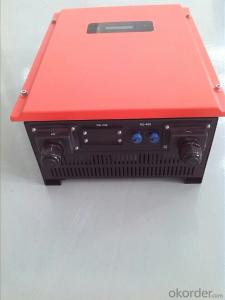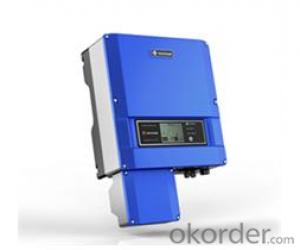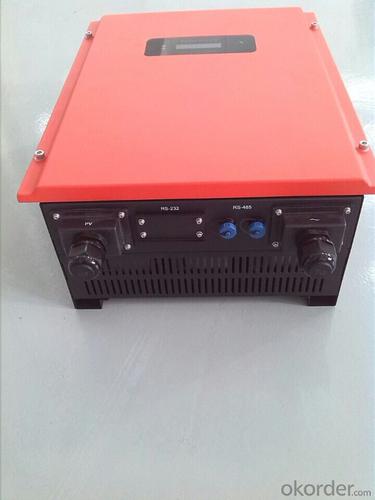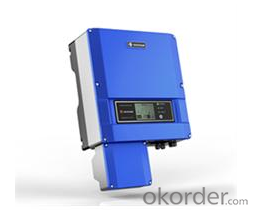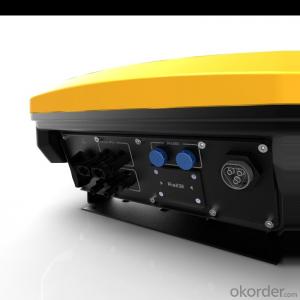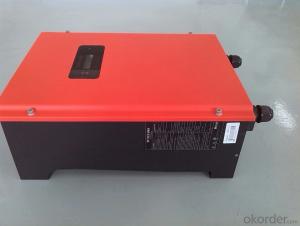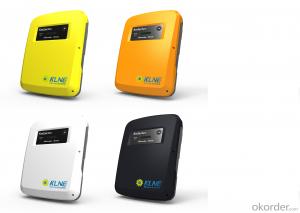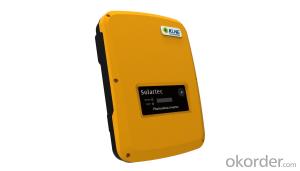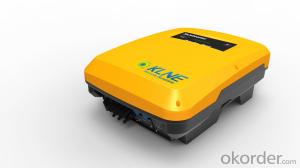Solar Inverter Skid - Off-Grid Type Solo-400 Series
- Loading Port:
- Shanghai
- Payment Terms:
- TT OR LC
- Min Order Qty:
- 10 unit
- Supply Capability:
- 1000 unit/month
OKorder Service Pledge
OKorder Financial Service
You Might Also Like
Product Description:
This system can keep 3 energy-saving bulbs with 15W working for 5 hours per day and a 5W radio working for 8 hours a day. The AC load can keep a 28in color TV (70W) working for 5 hours and a fan less than 60W running 5 hours.
It can work for 3 successive rainy days.
● System voltage:12V
● Output:220VAC/50Hz ● Power:400VA Product Datasheet:
Main Accessories | Specifications | No. | Notes |
Inverter | Solo-400 | 1 | Standard |
PV modules | Polysilicon 100Wp | 4 pieces | Optional |
Storage battery | Lead acid, maintenance-free, 12V/125Ah | 4 pieces | Optional |
Controller | Solo-VS12V/20A | 1 unit | Optional |
PV accessories shelf | Simple type | 1 set | Optiona |
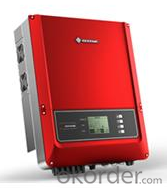
Product Advantages:
Powered by DC current
Can used out of doors
High effiency and low noise
FAQ
What is your payment terms?
We accept T/T payment, normally we need 20% T/T in advance, 80% payed before shipment.
What is your packing system?
We put the sistem in the wooden box.
Can you do OEM service?
Yes we can, but we need to do it with a certain order quantity.
- Q: How does a solar inverter handle overloading?
- A solar inverter handles overloading by constantly monitoring the power output from the solar panels. If the demand for electricity exceeds the maximum capacity of the inverter, it automatically reduces the power output to a safe level. This prevents the inverter from getting damaged and ensures a stable and reliable power supply.
- Q: How does a solar inverter handle voltage fluctuations from the grid?
- A solar inverter handles voltage fluctuations from the grid by constantly monitoring the voltage and adjusting its output accordingly. When the grid voltage increases or decreases, the inverter's control system regulates its own output voltage to match the changes, ensuring a stable and consistent supply of electricity is fed into the grid. This helps to maintain grid stability and protect the connected devices from potential damage caused by voltage fluctuations.
- Q: What is the role of a bypass switch in a solar inverter?
- The role of a bypass switch in a solar inverter is to provide a means for redirecting the flow of electricity in case of an emergency or failure within the inverter. It allows for the direct connection of the solar panels to the utility grid, bypassing the inverter, ensuring a continuous supply of electricity even when the inverter is not functioning properly. This helps maintain the stability and reliability of the solar power system.
- Q: How does a solar inverter handle voltage fluctuations from the battery bank?
- A solar inverter handles voltage fluctuations from the battery bank by utilizing its built-in control mechanisms and electronics. These components monitor the voltage output of the battery bank and regulate it to ensure stable and consistent voltage levels. This helps prevent any sudden or drastic fluctuations that could potentially damage electrical equipment or disrupt the functioning of the system.
- Q: What is the cost of a solar inverter?
- The cost of a solar inverter can vary depending on the brand, size, and features. On average, a basic solar inverter can range from $500 to $2000. However, more advanced or larger capacity inverters can cost upwards of $5000. It is important to consider the quality and efficiency of the inverter when determining its cost as it plays a crucial role in the overall performance of a solar power system.
- Q: Can a solar inverter be used with a solar-powered security system?
- Yes, a solar inverter can be used with a solar-powered security system. A solar inverter is essential for converting the direct current (DC) generated by solar panels into alternating current (AC) that can be used to power the security system. By using a solar inverter, the solar-powered security system can efficiently utilize and store the energy generated by solar panels, ensuring continuous operation even during periods of low sunlight.
- Q: Can a solar inverter be used with different types of power control devices?
- Yes, a solar inverter can be used with different types of power control devices. Solar inverters are designed to convert the direct current (DC) produced by solar panels into alternating current (AC) that can be used to power various electrical devices. They can be integrated with different power control devices such as charge controllers, smart energy management systems, and battery storage systems to optimize the efficiency and performance of the solar power system.
- Q: Can a solar inverter be used in a hybrid solar system?
- Yes, a solar inverter can be used in a hybrid solar system. A hybrid solar system combines both solar power and another source of energy, such as a battery or grid power. The solar inverter is responsible for converting the DC power generated by the solar panels into AC power that can be used in the home or fed back to the grid. In a hybrid solar system, the solar inverter would still perform this function, allowing the system to utilize both solar and other energy sources efficiently.
- Q: Can a solar inverter be used with building-integrated photovoltaics (BIPV)?
- Yes, a solar inverter can be used with building-integrated photovoltaics (BIPV). BIPV systems are designed to seamlessly integrate solar panels into the building structure, providing both energy generation and architectural functionality. Solar inverters play a crucial role in BIPV systems by converting the direct current (DC) produced by the solar panels into alternating current (AC) that can be used to power electrical devices in the building or fed back into the grid.
- Q: Can a solar inverter be used with different types of grounding materials?
- Yes, a solar inverter can be used with different types of grounding materials. However, it is important to ensure that the grounding system is compatible with the specific requirements and guidelines provided by the manufacturer of the solar inverter. The grounding materials used should meet the necessary safety standards and provide proper electrical grounding for the solar installation. It is recommended to consult with a qualified electrician or solar professional to determine the appropriate grounding materials for your specific solar inverter and installation.
Send your message to us
Solar Inverter Skid - Off-Grid Type Solo-400 Series
- Loading Port:
- Shanghai
- Payment Terms:
- TT OR LC
- Min Order Qty:
- 10 unit
- Supply Capability:
- 1000 unit/month
OKorder Service Pledge
OKorder Financial Service
Similar products
Hot products
Hot Searches
Related keywords
